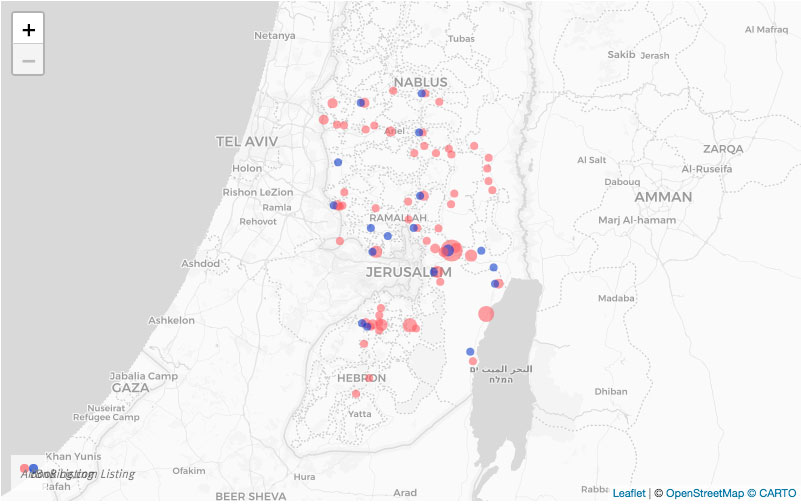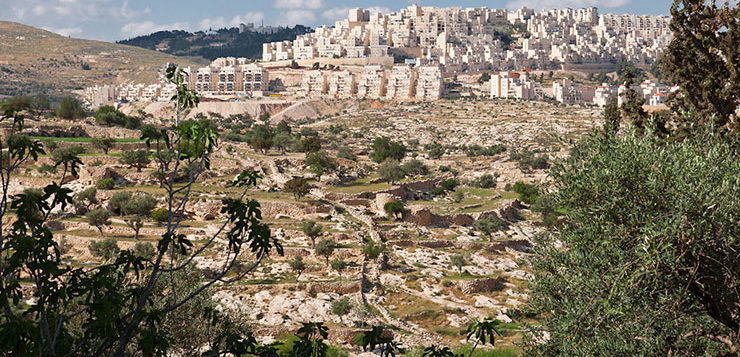A major American corporation with annual revenue of nearly $3 billion has pulled out of illegal Israeli settlements in Palestine’s West Bank, marking a major shift in global corporate politics around the Palestine/Israel dispute.
Airbnb, which enables ordinary homeowners to rent their houses or even just single rooms to travellers, made the announcement earlier this month. While it will continue to list properties in Israel-proper, illegal settlements on Palestinian land will no longer be available to customers.
The decision is expected to affect around 200 listings on the home-sharing website.
Israeli human rights organisation B’Tselem estimates there are more thasn 200 illegal Israeli settlements on Palestinian land, home to more than 600,000 people. Israel has long-claimed the settlements are legal, however international law is clear on the issue – under the Fourth Geneva convention, an occupying power is prohibited from transferring their population to occupied land.
The announcement by Airbnb came one day before Human Rights Watch – a Nobel Peace Prize winning organisation – was due to release a report, entitled Bed and Breakfast on Stolen Land: Tourist Rental Listings in West Bank Settlements.
It targeted both Airbnb, and Booking.com, a major travel fare aggregator company headquartered in Amsterdam.
“Settlements are unlawful under international humanitarian law; the transfer of civilians of the occupying power into the occupied territory is a war crime under the Rome Statute that created the International Criminal Court (ICC), and Palestinian residents of the West Bank enjoy legal protections against forced displacement,” the report noted.
“The business activity that Airbnb and Booking.com conduct helps make West Bank settlements more profitable and therefore sustainable, thus facilitating Israel’s unlawful transfer of its citizens to the settlements. In many cases, the companies list the properties as being located inside Israel, thereby misleading guests about where they will be staying and obscuring the fact that their payments are benefitting the settlement enterprise. Guests using Airbnb and Booking.com to book accommodations in ‘Israel’, thus may find themselves vacationing in an unlawful Israeli settlement in the West Bank.”
Airbnb’s decision has been widely condemned in Israel, and the US Government has also attacked the California-based company, with US vice president Mike Pence, saying that boycotts of Israel had “no place” in American commerce.

In some US states, it’s illegal to participate in economic boycotts of Israel – an Israeli legal organisation, Shurat Hadin has begun suing Airbnb in both Israel and the US.
Even so, the news of Airbnb’s withdrawal wasn’t met with unanimous outrage in Israel – one organisation, J-Street, attacked politicians and commentators who claimed Airbnb’s actions were “anti-Semitic”.
“These attacks, falsely charging Airbnb with ‘anti-semitism,’ ‘discrimination,’ and ‘boycotting Israel,’ do not promote the best interests of Israel and the Jewish people, but rather serve to aid the interests of the settlement movement,” J street said in a written statement.
Two other areas occupied by Israel – East Jerusalem and the Golan Heights – remain on the Airbnb listing.

East Jerusalem is considered Palestinian land, and has been occupied since the Six Day War in 1967. It’s theoretically separated from Israel’s West Jerusalem by the ‘Green Line’, an invisible border which marks the boundaries of Israel and Jordan prior to the war. Over time, Israel has re-settled around 200,000 Israeli citizens on Palestinian land in East Jerusalem, in direct contravention of international law.
The Golan Heights is also an occupied territory – it was seized by Israel from Syria in the Six Day War, and is now home to around 20,000 Israeli Jews – just under half the population of Golan.
Only one other region on earth – Crimea, in Ukraine – has been de-listed by Airbnb, following the Russian annexation in March 2014.
Booking.com – which was also targeted in the HRW report – has not moved on the West Bank issue. It’s a global company listed in Amsterdam. It’s parent company, Bookings Holdings, reported a $2.3 billion profit in 2017. The company also operates the Priceline.com, Agoda.com and Kayak.com websites, and has been repeatedly accused of anti-competitive practices across Europe.
In a media statement, a spokesperson for Airbnb said the decision by the company was a difficult one.
“US law permits companies like Airbnb to engage in business in these territories. At the same time, many in the global community have stated that companies should not do business here because they believe companies should not profit on lands where people have been displaced. Others believe that companies should not withdraw business operations from these areas.
West_Bank_Access_Restrictions“For us, the question centers on the approximately 200 Airbnb listings in Israeli settlements in the West Bank and whether they should be available for rent on our platform. We are most certainly not the experts when it comes to the historical disputes in this region. Our team has wrestled with this issue and we have struggled to come up with the right approach.
“In the past, we made clear that we would operate in this area as allowed by law. We did this because we believe that people-to-people travel has considerable value and we want to help bring people together in as many places as possible around the world. We also explained that going forward we would ask questions, listen to experts, seek out our community for their thoughts, and continue to learn.
“Since then, we spent considerable time speaking to various experts — including those who have criticized our previous approach — about this matter. As a global platform operating in 191 countries and regions and more than 81,000 cities, we must consider the impact we have and act responsibly.”
You can read the Airbnb media release in full here.
Donate To New Matilda
New Matilda is a small, independent media outlet. We survive through reader contributions, and never losing a lawsuit. If you got something from this article, giving something back helps us to continue speaking truth to power. Every little bit counts.




